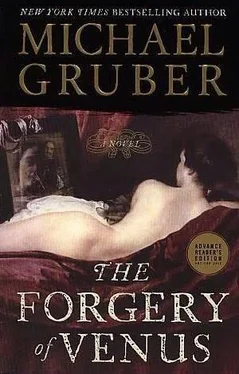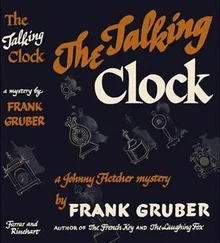After a while my bladder informed me that it wanted to be emptied. I knew I should get up and find either a seventeenth-century chamber pot or a toilet, but that would mean moving, and that was hard to contemplate. I could see why the people in the locked wards preferred to lie in their own filth all day. You could get used to lying in filth but never to the terror involved in deciding to move in a world that was implacably hostile and alien. Your feet could break off. Why not? Or if you moved, the Eaters could get you, if such monsters featured in your particular madness. Or you could turn into someone else. Best to stay still. I pissed in the bed.
I could see something now, grayness and shapes, a light source very faint. I was in the room in Krebs’s house. Maybe. I could be in China, or in Dr. Zubkoff’s laboratory. It looked like my bedroom at Krebs’s, but looks are deceiving, oh yes. Painters deceive you all the time, or used to.
I didn’t sleep as the daylight penetrated the room. I tried not to think, but thoughts came. Time passed. People came into the room and out again, I was cleaned and put back into a fresh bed. A woman tried to spoon food into my mouth, but I kept my jaws clenched and struck out at her and screamed until some men came in and tied my hands to the bed frame. That was fine with me. I wasn’t going anywhere.
A tapping on the door, or so it seemed. I lay very, very still and hoped it would go away. No, another tap and a voice. It said, “Chaz?” A familiar voice? How could I tell?
Sound of a door opening, and a click and the room was flooded with hideous light-I could see everything! I squirmed down under the covers to hide my face. A weight on the bed next to me, tugging at the quilt, a voice. It was Lotte’s voice, should have been comforting, I missed her so much, or somebody missed her, although it may have been someone else. She wanted me to get up, she pleaded, the children are upset. How long have they been here? I wondered. Are they really here at all?
She exposed my face and I didn’t try to hide it. Best to be completely passive. She looked a lot like Lotte my wife, but her face was blurry, not in focus, like the face of the dwarf in my painting. She touched my face. She said, “Oh, Chaz, what has happened to you?”
I’d like to know that too, I really would.
I didn’t know what to say to her. I didn’t want to ask her. I didn’t want to know who she’d been married to.
She said, “I have been so worried. Krebs said you had had a relapse, you were incoherent, raving. I came as soon as I could.”
I rummaged around for a while until I found my voice, one that sounded strange in my ears. I said, “I was painting the royal family. I am the greatest painter of the age.”
“Look at me,” she ordered. “You know who I am.”
I said, “You look like Lotte. Is this real?” and I laughed, a horrible sound. Lunatics are always depicted as laughing; we speak of maniacal laughter, and this is why. When the ground of reality is stripped away, when meaning itself takes a walk, what’s left is this monstrous hilarity.
And tears. I wept and she held me, and perhaps the reality of the familiar body, the smell of her hair, her perfume, worked on a brain level below the one that was screwed up so badly, and I calmed a little. She spoke slowly and gently as she often did to the children, about being summoned, about Krebs arranging everything, how he thought the presence of my family would help get me through this crisis.
And into my mind then, in the midst of the most extreme existential terror, came the thought that now my only course was to cleave to the wisdom of the sages and the bumper stickers and simply abandon all memory as unreliable, to discard the past and the future and simply try to exist moment to moment and see what happened. So, whoever this nice woman was, I was not going to ask her to confirm or deny anything about my past or about who Krebs was; I was just going to let her take the lead, and follow.
I said, “My memory is all scrambled.”
“But you remember me, yes? And the children?”
“Yes. How are the kids?”
“Oh, you know, all excited, the plane ride, this place. It’s quite lovely. There’s a little farm attached to it. They were down there all morning, ducks and goats and so on. Did I tell you, I’ve found a marvelous clinic in Geneva for Milo? They think they can really do something for him.”
I said that sounded great, I said I was fine, not to worry. So, I made myself move like one of those robots controlled by a little remote, press one button for out of bed, another for the shower, and so on. I got dressed, greeted the world, and life, of a sort, resumed.
It was my daughter, Rose, who made the difference. I fell upon her with an intensity that amazed both of us, hugs and kisses and foolish talk. I spent unaccustomed hours with her over the next days, I’m not busy anymore, all the time in the world. She was the only person in my life who didn’t think I was crazy, she accepted me at face value, not caring for what the world thought. Could build your life on a kid, many people do, although it’s unfair as hell to the kid-they’re supposed to build on you. We walked through the woodlands, dabbled in streams, did little art projects. She found a shredder somewhere and made a big sheet of collage, the farm and its animals, but didn’t have enough pink for the pigs.
We were much at the farm, always accompanied by Franco. It’s where the Bienekes live, and there are some workers who actually do the farm work, very feudal arrangements hereabouts, the guys actually wearing lederhosen. This time of year we have young animals; Rose is entranced, it’s like her Richard Scarry animal book coming to life. Fine weather, fluffy clouds, a Constable painting, felicity surrounds us, except for our son dying in his room, but here’s the great part of being in the now: it doesn’t matter what’s going to happen or what has happened.
I believe I was as pleasant to others as I have ever been, a little shallow maybe, but no one seemed to mind. Lotte treated me very gently, like a live bomb, or no, more like she’s always treated Milo, like somebody who might disappear at any moment. Milo himself was stiff and formal with me, he’s at the age when insanity in a parent is particularly distressing. For my part, I avoided him as much as I could. I couldn’t bear the expression on his face when he looked at me.
At the farm one morning Rose brought me a little duckling and I was able to focus my full attention on the squirming golden ball, and on my girl’s delight in the duck, and on the day, which seemed to last an amazingly long time, like summer days in childhood. Rose was able to drag me uncomplaining around the farm like a large rolling toy.
We entered the sheep barn. There were young lambs. As we inspected them, I knelt and said softly to my daughter, “Could I ask you a question?”
“Yes. Is this a game?”
“Uh-huh. I’m pretending I don’t know anything and you have to tell me stuff, okay?”
“What stuff?”
“Like what’s my name?”
“It’s Chaz. That’s a shortcut for Charles.”
“Very good! And where do I live?”
“In your loft.”
“And where do you and Mommy and Milo live?”
“In our house. It’s 134 Congress Street, Brooklyn, New York. I know our phone number too.”
I hugged her tight. “I bet you do, honey. Thank you.”
“Is this all of the game?”
“Yes, for now,” I said.
What a wonderful day!
It got better. We had lunch at the farm with the workers, big sweaty blondes who made much of my daughter and wife in German. Rose is bilingual in French and was delighted to discover that there was another language in which people can be sweet to her, and she was able to communicate a little, with Lotte supplying phrases both amusing and useful. Such hearty laughter!
Читать дальше












